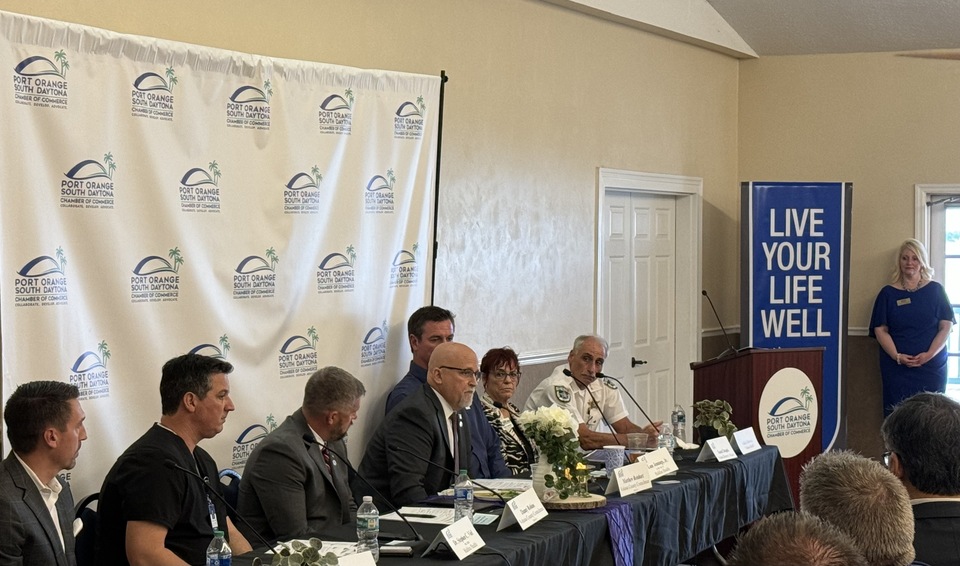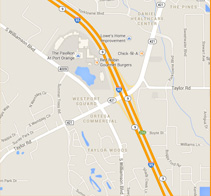It's Much Worse Than You May Realize - the Opioid Crisis Battle in Volusia County
By Cathy Padilla
Since 2020, 1200 Volusia County residents have died from accidental drug overdoses. I've heard the statistic before and ignorantly felt badly for the victims who made the choice to use and dismissed it as something beyond my circle. I assumed most of those who died were college-age. Most of them were long-time addicts or criminals. As Volusia County Sheriff Mike Chitwood shared today at the Port Orange/South Daytona Chamber of Commerce networking luncheon, those are common misconceptions. Only a few years ago, pre-COVID, the number of annual deaths from overdose in this county was 58. It climbed to 400 in 2021 and 303 in 2023. Heroine doesn't even break into the top 10 drugs responsible for the deaths.
"This (the opioid crisis) is the biggest threat to our community," said keynote speaker Sheriff Chitwood. "8500 people have overdosed in Volusia County since 2020. 1200 of them lost their lives. Overdose is no longer a consequence of bad decisions. Every overdose death is now investigated as a homicide."
Who are the victims? They are our family-members, neighbors, co-workers, and friends. The deaths are ruled as homicides because the majority of the victims had no idea what they were ingesting. They believed they were taking a pain killer, or THC oil as they vaped, or maybe a xanax or an adderall pill. The average age among the dead is 50, with 67% of those who died being older than 40. 71% are male and only 9% are younger than 30. Not one was younger than 18. We've all heard the name of the drug responsible - Fentanyl - now the number one cause of death in the United States among people 18 - 49. According to Sheriff Chitwood, law enforcement is fighting back with every weapon available but the amount of drugs coming into the area and into the country is overwhelming. One of the main ways the drugs are delivered? Through the United States Postal Service, UPS, and FedEx.
So what do we do?
The Port Orange/South Daytona Chamber asked the same question and on Thursday, April 11, hosted a networking luncheon and panel discussion with more than 150 political, community, law enforcement, and business leaders present at the Riverside Pavilion in Port Orange. The focus - developing a recovery friendly workplace, because if people don't turn to narcotics or vaping to begin with, they won't accidentally take Fentanyl. President and CEO of the Chamber, Barbara Ann Heegan, opened the event and announced the creation of a new committee task force that will work with the Volusia Recovery Alliance (VRA) to both educate and serve and to help businesses be part of the solution.
Among those in attendance were Senator Tom Wright, who lead the Pledge of Allegiance; Rev. Dr. William Bradley, Jr. of New Hope Baptist Church, who gave the invocation; keynote speaker Volusia Sheriff Mike Chitwood; Dr. Alex White of Progressive Medical Research who gave the closing remarks; and the panelists: Karen Chrapek, executive director of the Volusia Recovery Alliance; Volusia County Councilmembers Matthew Reinhart and Danny Robins; Lane Jennings Jr., program supervisor and coordinator of adult behavioral services at Halifax Health; attorney Doug Collins of Cobb Cole Law Firm; and Dr. Stephen C. Viel, a Shoreline Medical Addiction Treatment specialist with Halifax Health.
Each attendee received two free Narcan kits courtesy of the VRA and its “New Chance Narcan Outreach Committee." Narcan, also known as Naloxone, is a medicine that can rapidly reverse an opioid overdose.
Missy Ellerbee, office manager and outreach specialist from VRA, shared how to use Narcan as well as important facts about the life-saving medicine. She also cleared up several misconceptions including: 1. Narcan will not harm someone who is having a different medical emergency than an overdose 2. Administering Narcan to someone will not put you in legal jeopardy because of the Good Samaritan Law 3. Narcan can be stored safely in the heat of a car during the summer.
A common theme among all the presenters was the need for compassion for those addicted to any type of drug. The stigma of being a "drug addict" is one of the main reasons cited for people not getting help. Jennings from Halifax Health spoke of people in the workforce being afraid to get help, afraid of workplace consequences, and not knowing where or how to start. He said the goal should be for every place of employment to have a very clear path for anyone who wants to get help to be able to do just that. Heegan said in her remarks that the Chamber is working to stand in the gap, so that small businesses can offer the same path to help as larger corporations. While Chrapek from the VRA stressed how "one pill can kill" and that the drugs killing on our streets are often legal drugs.
Several of the speakers were long-time recovering addicts, happy to share that the help they once received and ongoing support has made all the difference. One gentleman in the room had been administered Narcan 18 times before he found his way into recovery and to being an active, successful member of our community. Sheriff Chitwood stressed that hope and compassion saved the man's life.
Sheriff Chitwood also shared about the Family Reunification Center and Juvenile Assessment Center in Volusia. He said that when they do drug testing on the kids, those who give positive results all have traces of Fentanyl, cocaine, or methamphetamine they unknowingly ingested through vaping. He also said that in Volusia County there is at least one child each and every week that is hospitalized from vaping and that drugs are "destroying our future." His solution is a three-legged-stool approach which each leg being interdependent and equally necessary. Leg one - law enforcement. Getting the dealers and drugs off our streets. Leg two - education. People have to know the dangers today are different from just a few years ago. Businesses need to step up and offer employees and their families help. Everyone needs to be educated on how Narcan saves lives and how to administer it in an emergency. Leg three - treatment. Help has to be readily available, judgement free, and filled with hope and compassion.



